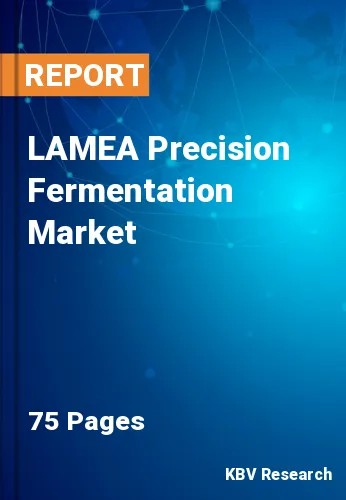
The Latin America, Middle East and Africa Precision Fermentation Market would witness market growth of 45.6% CAGR during the forecast period (2022-2028).
In the case of a protein target, the DNA of the host organism contains the instructions for producing the protein, either as naturally occurring genes or as genes that have been artificially inserted. Both engineered as well as non-engineered methods may be viable, depending on the aim. For instance, Impossible Foods engineers a yeast host strain to accommodate the soy leghemoglobin protein for effective and scalable production. However, Triton Algae Innovations, a microalgae company, is selling heme proteins that are inherent to its algal strains without the use of engineering.
Direct encoding of non-protein targets' synthesis cannot occur in the host's DNA. Instead, a number of enzymes that make up the biosynthetic pathway for creating the target compounds are encoded by the genome. The fatty acids DHA and EPA, for instance, are the intended molecules for algal omega-3 production, but the recipe for making these fatty acids is made up of a number of gene-encoded enzymes that transform precursor fatty acids into these desired fatty acids inside the cell. Depending on the precise aim and the chosen host organism, compounds like lipids or flavoring molecules can be synthesized in microbial hosts both with or without the utilization of engineering techniques.
The demand for precision fermentation process is being majorly propelled in recent years across the food and beverages industry. In addition, the growth of the precision fermentation market is estimated to be fueled by the rapidly increasing awareness and health consciousness in people all over the world as well as an increasing number of vegan customers. Hence the market is anticipated to flourish in the coming years.
South Africa has a very robust agriculture sector, which is one of the factors driving the adoption of the precision fermentation approach in this region. One of the most diverse agricultural sectors in the world, South Africa's agriculture includes extensive and intensive corporate and private crop farming systems that produce grains, vegetables, fruits, nuts, and other produce. The foundation of South Africa's agricultural economy is its well-established commercial farming sector, which in 2020 registered the strongest growth rate of all economic sectors at 13.1%. Climate. The subtropical to the Mediterranean range of South Africa's climate offers a wide variety of farming opportunities.
The Brazil market dominated the LAMEA Precision Fermentation Market by Country in 2021, and would continue to be a dominant market till 2028; thereby, achieving a market value of $201.9 million by 2028.The Argentina market is experiencing a CAGR of 46.4% during (2022 - 2028). Additionally, The UAE market would display a CAGR of 45.2% during (2022 - 2028).
Based on Microbe, the market is segmented into Yeast, Fungi, Algae and Bacteria. Based on Application, the market is segmented into Dairy Alternatives, Meat & Seafood, Egg Alternatives and Others. Based on Ingredient, the market is segmented into Enzymes, Heme Protein, Egg White, Collagen Protein, Whey & Casein Protein and Others. Based on countries, the market is segmented into Brazil, Argentina, UAE, Saudi Arabia, South Africa, Nigeria, and Rest of LAMEA.
Free Valuable Insights: The Global Precision Fermentation Market is Predict to reach $11.8 Billion by 2028, at a CAGR of 41.5%
The market research report covers the analysis of key stake holders of the market. Key companies profiled in the report include Motif FoodWorks, Inc., Perfect Day, Inc., Geltor, Inc., Nourish Ingredients Pty Ltd., The Every Company, Impossible Foods, Inc., Shiru, Inc., Mycorena AB, Remilk Ltd., and Triton Algae Innovations, Ltd.
By Microbe
By Application
By Ingredient
By Country
Our team of dedicated experts can provide you with attractive expansion opportunities for your business.
